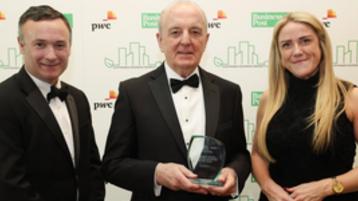Also
Martin warns AI innovation needs to be balanced with regulation

The Taoiseach has compared Artificial Intelligence to the arrival of the printing press and the Industrial Revolution, warning that Europe needed to balance innovation with regulation.
Speaking ahead of the AI Summit in Paris, Micheál Martin said the EU risked being left behind if the only regulation of AI was emanating from Europe.
Last night, he joined a working dinner hosted by French President Emmanuel Macron and Indian Prime Minister Narendra Modi.
US Vice President JD Vance was also present, as well as senior tech CEOs, such as Sundar Pichai of Google and Sam Altman of OpenAI.
Mr Martin said: "There were very strong voices last evening about the importance of protecting children and young people, for example, [protecting] mental health, protecting democracy, [combatting] hate speech, the idea of focusing in on specific areas where there would have to be regulation, whilst, however, ensuring that there would be an innovation environment in Europe that would match the United States, for example, or other parts of the world."
Likening AI to the Industrial Revolution and the printing press, the Taoiseach said: "Every time there's a major breakthrough in technology, fears arise. People do identify the potential dangers from such a breakthrough.
"On the other hand, we also need to be very strongly aware of the enormous benefits that can accrue from breakthroughs in technology."
These included breakthroughs in the sphere of diagnostics, the management of diseases and chronic illness.
The summit will be dominated by far-reaching discussions involving world leaders, tech corporations and non-governmental organisations about the risks and opportunities posed by the new frontiers of AI.
World leaders will hold formal talks at the summit, seeking elusive common ground on a technology subject to a global race for promised economic benefits.
Hosted by Mr Macron and Mr Modi, the gathering comes hours after Elon Musk reportedly put in a bid for star developer OpenAI, underscoring AI's potential to gather power into a single pair of hands.
Attempts to reach global agreement may also frustrate major powers such as the United States and China, which have their own geopolitical tech priorities.
Media reports suggest that neither Britain nor the US - two leading countries for AI development - will sign a planned joint declaration as it stands.
"Good AI governance" requires "clear rules that foster the acceptance of AI technologies", German Chancellor Olaf Scholz was to tell counterparts, according to a draft of his speech seen by AFP.
Outside observers criticised an alleged leaked draft of the joint statement for failing to mention AI's suspected threat to humanity's future as a species.
The supposed draft "fails to even mention these risks" said Max Tegmark, head of the US-based Future of Life Institute, which has warned of AI's "existential risk".
In recent weeks, the United States' $500 billion 'Stargate' programme led by ChatGPT maker OpenAI, and the emergence of the high-performing, low-cost Chinese start-up DeepSeek, have brought into focus the technical challenges and price of entry for nations hoping to keep abreast on AI.
Meanwhile, the Musk-led $97.4-billion bid for OpenAI reported by the Wall Street Journal would compound the tech influence of the world's richest man, already boss of X, Tesla, SpaceX and his own AI developer xAI as well as a confidant of US President Donald Trump.
Sam Altman, the OpenAI chief set to speak in Paris later today, responded to the reported offer with a dry "no thank you" on X.
For France, Mr Macron vowed yesterday to blast through red tape to build AI infrastructure in his bid to keep Europe competitive.
"We will adopt the Notre Dame de Paris strategy" of streamlined procedures that saw France rebuild the landmark cathedral within five years of its devastation in a 2019 fire, he said.
Mr Macron's push to highlight French competitiveness saw him repeatedly trumpet €109bn to be invested in French AI in the coming years.
He has also hailed France's extensive fleet of nuclear plants as a key advantage providing clean, scalable energy supply for AI's vast processing needs.
"I have a good friend in the other part of the ocean saying 'drill, baby, drill'," Mr Macron said in a reference to Trump's pro-fossil fuels policy.
"Here there is no need to drill, it's plug, baby, plug!" he said.
Ms Von der Leyen is expected to make further announcements on the bloc's competitiveness today.
'Excessive regulation' could 'kill' AI sector - Vance
JD Vance warned against "excessive regulation" of artificial intelligence.
"Excessive regulation of the AI sector could kill a transformative sector just as it's taking off," Mr Vance told global leaders and tech industry chiefs in the opulent surroundings of the French capital's Grand Palais.
The US Vice President singled out the European Union's Digital Services Act by name for criticism over "massive regulations it created about taking down content and policing so-called misinformation" that he said placed an unfair burden on American tech giants.
Mr Vance also jabbed at China as one of several "authoritarian regimes" he said were looking to use AI for increased control of citizens at home and other countries abroad.
"Partnering with them means chaining your nation to an authoritarian master that seeks to infiltrate, dig in and seize your information infrastructure," Mr Vance said.
He pointed to "cheap tech ... heavily subsidised and exported by authoritarian regimes", referring to surveillance cameras and 5G mobile internet equipment widely sold abroad by China.


